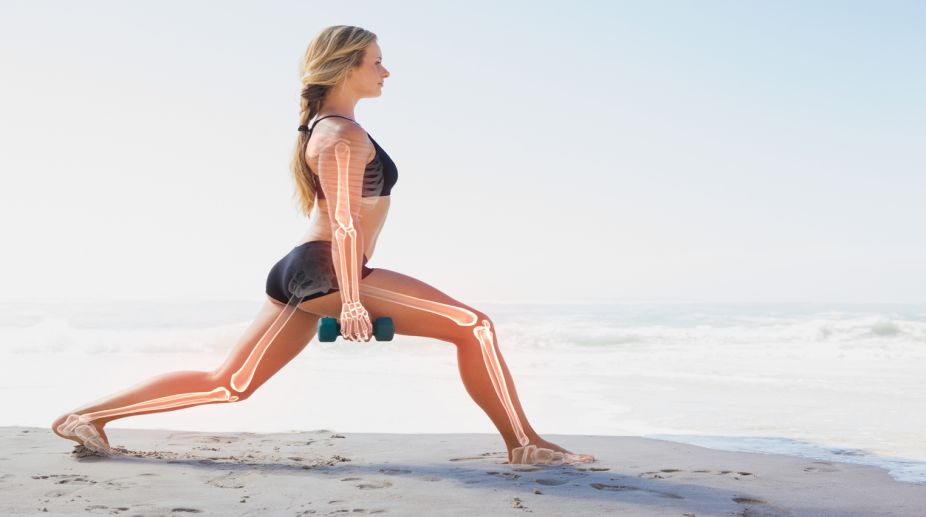If you want to have a pain-free ride in your golden years, better ditch the couch now and get walking. According to health experts, failing to adopt regular exercise regime early may lead to weaker bones later, leading to joint and bone problems such as arthritis and osteoporosis and, even, bone fractures.
Studies suggest that bones respond better to particular types of exercise, including weight-bearing exercises, resistance training, high-impact exercise and balance training.
Advertisement
"Resistance training or plyometric training help reduce the levels of protein sclerostin, the excess of which can adversely affect bone density. On the other hand, it increases insulin like growth factor 1 (IGF-1, a hormone that improves bone growth)," Rishabh Telang, a fitness expert and level-2 crossFit trainer with Bengaluru-based Cult fitness chain, told IANS.
"In response to weight bearing activities, Osteo-blasts (bone-forming cells) get migrated to the surface of the bone and starts the process of bone modelling. This entire process of Osteo blast migrating to the bony area improves bone density," Telang added.
A recent study, published in the Journal of Bone and Mineral Research, found that adolescents who participated in moderate-to intense physical activity during growth years exhibited greater bone mass in areas that contribute to superior bone strength.
"Bone health is crucial to our fitness and it begins with maintaining a healthy bone mass. For young adults, regular exercise, well-balanced calcium diet, exposure to sunlight are extremely important," Rajiv Thukral, Senior Consultant-Orthopedics, Max Super Speciality Hospital, Saket, told IANS.
Muscle-strengthening exercises are any activity that requires your muscles to work harder than normal.
This type of resistance exercise works the tendons that attach muscle to bone, which in turn boosts bone strength.
Strength training also results into muscle hypertrophy-increase in size of muscle cells-which increases the force exerted on the bones.
"In response to that, the bones must increase in mass and strength to support the structure of hypertrophied muscles. Thus, an increase in muscle mass and strength may result in a corresponding increase in bone mineral density," Telang said.
"People can also start with daily brisk walks and should not exhaust their body by sudden and extreme exercises in the gym," Thukral cautioned.
Yoga is another option that can be explored by people who do not want to go to the gym.
"Stretching, yoga and brisk walk, etc. could be extremely beneficial in strengthening the bones," Thukral added.
The experts also warned that women over age 50, especially post-menopausal women, have the greatest risk of developing weaker bones.
"One should also get the regular bone densitometry test done to know the real status of bone health. Older adults should do some physical activity — let be it a simple morning walk," noted Ishwar Bohra, Senior Consultant Joint Replacement & Arthroscopy Surgeon, BLK Super Speciality Hospital.
It is also pertinent to focus on foods that are rich in calcium, Vitamin D and other nutrients as these are important for bone and overall health. A diet low in calcium can also lead to diminished bone density, early bone loss and susceptibility to fractures.
"It is very important to start exercising at an early age as it indirectly keeps joints well lubricated as well as bones strong and healthy by doing load-sharing between bone and shoulders," added Sanjay Gupta, Associate Director (Orthopaedics and Joint Replacement Department) at Jaypee Hospital.











